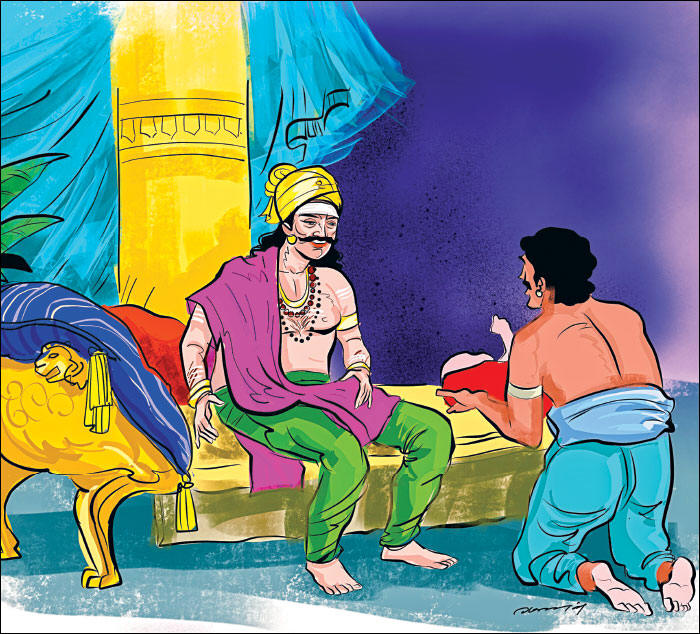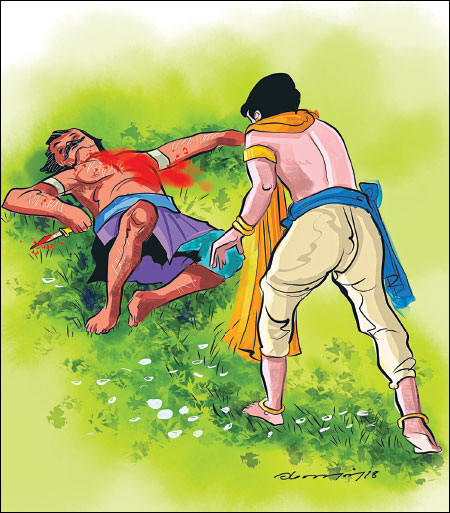திருவருள் செல்வர்கள்! - 11
Sakthi Vikatan September 11, 2018
Posted Date : 06:00 (11/09/2018)
திருவருள் செல்வர்கள்! = Divine Grace Staretsy
Starets = Spiritual leader whose wisdom stems from God.
Straretsy = Plural of Starets.
பி.என்.பரசுராமன்: Author P.N.Parasuraman
ஓவியங்கள்: ரமணன் Drawings: Ramanan
ஏகம்பவாணன் Ēkambavāṇaṉ
It is common for people to languish at the sight of people in higher status. Good and evil exist at all times and are ubiquitous. It makes no sense to say, “Bad times are on us now. Those days were good.” 1
Since the advent of the earth, times did not go bad. It is we who have gone bad. This series, ‘Staretsy Divine Grace.’ The series helps us to rediscover ourselves and make us stable once again. 2
An upright man languished looking at the Chera, Choza and Pandiya kings and we will look at the history of one of those honest men. 3
Vēḷāḷakula (Vēḷāḷa-kula) Thilakar Vāṇaṉ, a farmer had a thousand plows. He said, “The reason God created me was to plow and offer food to others.” 4
What are we to do? The fruiting tree gets hit with a stone. Misery haunts good people. Vāṇaṉ had a baby boy. Vāṇaṉ and his wife were joyous. Should we not cast a horoscope for the baby? 5

Vāṇaṉ invited the astrologer to cast the baby’s horoscope. The Jyōtitar (Astrologer) sat down to cast his astrology charts. Were they enthused because the rich man will shovel riches into their hands? Not at all. The rich man was not only a good man but also a virtuous man. The astrologers were happy to cast astrology for the infant because they felt happy being invited to cast the charts for a baby born high. 6
They took time, effort and concentration to cast the charts. Once the casting was over, they all sported dark visages. Noting that dark collective countenance, the father asked, “What happened? Do not hesitate and tell it as it is.” 7
The astrologers in unison told Vāṇaṉ, “This child’s parents’ life will come to an end very soon.” 8
The astrologers were accomplished ones. Their saying won’t be in error. But Vāṇaṉ was not upset. Doing the formal respects, he sent them on their way. 9
As predicted by the astrologers, Vāṇaṉ’s wife gave up her earthly life. Vāṇaṉ noticed it. ‘My end is nearing. I cannot trust the care of the infant to my relatives. They will end the child’s story (Cause death) and seize the property.’ Thinking in those terms, he concluded. 10
Sāmbaṉ, one among his servants, was a virtuous man always holding Satyam (Truth) in high regard. Calling Sāmbaṉ, Vāṇaṉ entrusted his infant and the property to his care. 11
Vāṇaṉ: Appā! Consider this tender child as yours, and raise him to adulthood. That is your responsibility.” 12
The servant was surprised. Vāṇaṉ told him, “Do not worry! I know you very well. You are not a usurper. I buried in the field a great amount of riches. Take the treasure and raise the child.” A few days later, Vāṇaṉ died. 13
Ēkaṉ, the upright servant’s mind was in a turmoil. Adopting the infant, he played the role of his father and met his obligations. He provided him a good home and raised him. 14
When the child reached five years of age, Ēkaṉ (the faithful servant) enlisted Kambar to educate him. When the youngster completed his studies, Ēkaṉ the upright servant chose an eligible bride from the youngster’s own Vāṇaṉ (வாணன்) caste and got him married. 15
The child’s parents had divinity, the adoptive servant had grace, and the youth molded by divinity and grace became a starets. This combination of Divinity and Grace does not happen to all. 16 Starets = Singular, a spiritual leader whose wisdom stems from God
No one knew his natal name given by the parents. Since he was married, we can regard him a youth. 17
The youth and his wife led a happy life. Ēkaṉ said to the youth, “Brother! According to your father’s wishes and words, I raised you properly and got you married. Hereon, it is your responsibility.” Ēkaṉ handed over the ownership of the inheritance to the youth. 18
“Brother! Beside these riches, your father told me that he buried a vast wealth underground in the field. Do not forget to take possession of that buried wealth.” 19
The youth employed a servant to dig to find the treasure. When the servant dug the ground, he bled from his nose and mouth profusely and died. Subsequently, a vast cloud of black wasps flew out of the ground and attacked people. 20
The divine and gracious youth stopped the digging. He wondered what more he could do. That night itself, he got the answer. 21
A ghost appeared in the youth’s dream and said, “Are you trying to take the sixty million (Rupees) worth of gold guarded by me all these years? That will not happen. If you want to acquire the treasure, you have to sacrifice a person endowed with grace, love, and truth. Then, I will hand over the buried treasure to you and become your faithful, obedient servant.” 22
The youth woke up from the dream and narrated the dream to the adoptive Ēkaṉ, the servant-parent. Ēkaṉ Sāmbaṉ said, “That buried treasure must be retrieved.” 23
The youth challenged the servant, “Should life be sacrificed for this?” Ēkaṉ continued. 24

Ēkaṉ: Brother! Your father told me that I was somewhat a good man. I don’t know whether I am such a person. You may sacrifice me and take the buried treasure.” 25
The youth was shaking and invoked God, Siva. You raised me with love and care. Could you talk like this? You are much greater than my father. How could I repay you for what you did? I don’t want that buried treasure. Let that ghost keep it. I won’t go that way anymore. “26
Ēkaṉ left the place and thought one day ‘I must die.’ Instead of dying as a worthless being, is it not loftier to die for the master’s son? During the night, he went to the place of buried treasure and sacrificed himself. 27
The ghost appeared in his dream and narrated, “Your field worker sacrificed himself. He was an upright man. Now you can take the buried treasure. As I promised, I will become your servant. 28
The youth shook to the core. When the youth went to the place of treasure, he saw Ēkaṉ Sāmbaṉ lying in a pool of blood with his neck cut. 29
The youth cried out and performed all the final ceremonies. 30
He did not stop at that. With no evil thoughts and to honor the memory of the faithful servant, the youth christened his first name as Ēkaṉ, middle name after his teacher, Kambaṉ, and his last name after his father, Vāṇaṉ. His changed his name as Ēkaṉ Kambaṉ Vāṇaṉ. 31
Ēkakambavāṇaṉ (Ēkaṉ-kambaṉ-vāṇaṉ) over the years has changed to Ēkambavāṇaṉ. Ēkambavāṇaṉ’s fame in the ancient texts has many different descriptions. 32
Ēkambavāṇaṉ becomes ecstatic and forgets his awareness at hearing the word, ‘Tamil experts.’ He was determined to see that the Tamil Literati on any account should not suffer. 33
Besides, no one known to him should go hungry. When Ēkambavāṇaṉ was of this nature, his wife was of the nature of gold studded with diamonds. She was an educated woman with courage, mercy, love, giving, and a pure heart. 34
Ēkambavāṇaṉ’s fame spread all over the land. His benevolence, fearlessness and high qualities made even kings respect him. 35
On one occasion, Chera, Chola, and Pandiya kings came to his mansion. At that time, Ēkambavāṇaṉ was on the farm. The kings were aware, Ēkambavāṇaṉ was on the farm. 36
Whatever it is, they were kings. Their words were tainted with ego and vituperation, (because Ēkambavāṇaṉ was not in the mansion to receive them with pomp and circumstance) 37
The kings were laughing and spouted words of scorn, asking the minions, “Oh! he is pulling the paddy seedling and replanting them.” 38
Ēkambavāṇaṉ’s wife listening to the insulting words of the kings, boiled with rage inside. Well-versed in Tamil literature, the elite lady sang a song that was the answer to the royal mockers. 39
The poem, she composed was handed over to the kings. 40
சேனை தழையாக்கச் செங்குருதி நீர்தேக்கி Soldiers as leaf-fertilizer, their red blood as the irrigation water
ஆனை மிதித்த அருஞ்சேற்றின் – மான The fields stomped the field to produce the mud-sludge
பாவேந்தர் வேந்தன் பறித்து நட்டான் ஏகம்பன் Ēkambaṉ pulled the crowns of the kings and planted
மூவேந்தர் தங்கள் முடி the crowns as seedlings
The poem in euphemism and the meaning: The soldiers of the enemies were the leaf-fertilizer spread on the fields. Their blood was the irrigated water for the fields. The elephants stomped the grounds to make mud-sludge. Ēkambavāṇaṉ pulled the gem-laden crowns of the kings and replanted them as seedlings. 41
- திருவருள் பெருகும். Divine Grace will flourish.
- பி.என்.பரசுராமன் P.N. Parasuraman
ஓவியங்கள்: ரமணன் Images: Ramanan.
Reading the poem, the kings begged for forgiveness and left the premises. Though they were kings, the poem taught them decency to change their errant ways. Ēkambavāṇaṉ’s wife was the epitome of intelligence, literary greatness, straightforwardness, and courage. 42
Vāṇaṉ’s divine character, the grace of the foster parent, and the Kambaṉ’s tutelage contributed in raising Starets, Ēkambavāṇaṉ. Pure mind, unforgetting gratitude, and Tyāgam (munificence) are the pathways in this historical narrative. Let us realize it and uplift ourselves.
Divine Grace will grow.